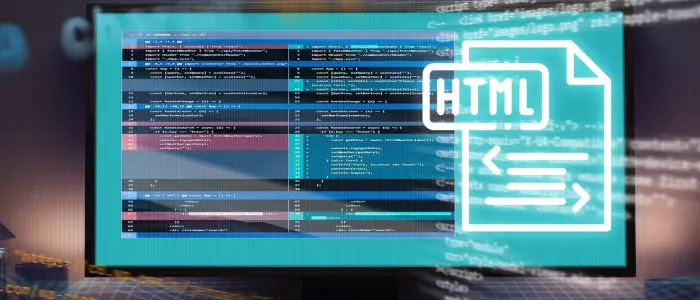What is Web Application Development
Web applications are a functionality that link user requests and data, facilitating processes done by the server for programs or requests pertaining to email, social networking online shopping etc These programs run on a web server and interactions are channeled through browsers fulfilling user interaction
Evolution of Web Technologies

In the early days of the internet, early web applications were built on simple HTML, this offered limited functionality and of course minimal interaction. As evolution continues AJAX, responsive design and mobile first approaches have transformed digital experiences making web development more robust and user friendly.
The Role of Programming Languages
Programming languages are of two types
- Front End – Here users interact with this technology
- Back End – Here server side processing and business logic execution happens
Based on the project requirement a mixture of languages are finalized
Front end Development Languages
Front end development consists mainly of three languages
- HTML
- CSS
- Javascript
HTML
HTML known as Hypertext Markup language, is the backbone of any web page or website, this language provides the basic layout of the entire website and elements
Features of HTML
- Defines the structure and layout of website and landing page
- Improves accessibility
- Enhance SEO through the use of elements such as <header>, <footer>, <section>
- Insert and Embed multimedia content
- Forms to capture user input
Advantages of HTML
- Easy of use
- Supported by all browsers
- Essential for creating any webpage
- Can be further styled with CSS and further functionality boosted with javascript
Disadvantages of HTML
Language is limited to static content
Requires CSS+Javascript to further improve the experience
Vulnerable to security issues if not implemented correctly
CSS (Cascading Style Sheets)
CSS controls the visual representation of a web page or website.
Features
CSS is used to improve the look and feel of web pages
Used in responsive design to adapt to different mobile devices and screen sizes
Animations such as transitions and visual effects can be facilitated
With the help of Grid and Flexbox CSS can be further used for complex designs
Advantages
Reusable styles across all pages of the website or to just one particular page
Lots of design possibilities
Can be used to design precisely of the page or site layout
CSS can adapt to Desktop, Laptop, Tablet and Mobile screens
Can be used to reduce page load time
Can be easily update for maintaining the design
Disadvantages
Complex for large projects
All features are not compatible on all browsers
May display inconsistently across different browsers
Large CSS files can increase load time
Javascript
Javascript is a programming language used to make the page interactive and dynamic
Features and Use Cases of Javascript
Can respond to user interaction like clicks, hover and for submissions
With the help of AJAX and fetch API communication is established with the server for carrying out tasks with the need for reloading the page.
Complex calculations, business logic can be implemented through this programming language
Advantages of Javascript
With dynamic elements user experience is enhanced
Can be used for implementing a wide range of functionalities
User interaction is managed well
Disadvantages of Javascript
Security can be exploited through cross site scripting
May slow down the page
Code execution varies based on browser
Debugging in large applications is challenging
Frameworks and Libraries

React
With its component based architecture single page applications can be built. React is more of a Javascript library.
Features & Use Cases of React
Reusable components
Can manage states, side effects in functional components
Dynamic routing is enabled for single page applications
Advantages of React
Efficient updates
Encourages reusable components
Extensive support
Used in both web and mobile app development
Powerful debugging and development tools
Disadvantages of React
Difficult to learn
Requires additional setup & configurations
Development is rapid hence keeping the knowledge up to date is challenging.
State management without libraries can be tricky
Overwhelming because of extensive information and possible different approaches
Angular
Angular, developed by Google, is ideal for building complex web applications.
Features & Use Cases of Angular
Can synchronize data between model and the view
Component management dependency is efficient
HTML can be extended with custom attributes and elements
Can handle asynchronous data streams
A command line interface to manage angular projects
Advantages of Angular
All in one solution for large scale applications ranging from built in tools for routing to forms
Ideal programming language for enterprise level applications
Built in testing tools and framework support for unit and a complete end to end testing
Since developed by Google, a full community support for further development and support
Disadvantages of Angular
Learning is very extensive with too many options for configuration
May be slower framework because of complexity
Requires more configuration and more boilerplate code
Updates can cause breaking changes which will again require a significant amount of recoding
Vue
A progressive Javascript framework ideal for building user interfaces, this programming language can incrementally adopt
Features & Use Case of Vue.js
DOM is updated automatically when the data changes
Components are maintainable and reusable
DOM manipulation is simplified
Command Line Interface for project scaffolding and management
Seamless integration for building single page applications
Advantages of Vue.js
Gradually can in integrated into large projects
Framework is light and fast with a low run time
Easy to learn with a lot of support in documentation available on the internet
Community support and an ecosystem of plugins and extensions
Disadvantages of Vue.js
Smaller community compared to other languages like React & Angular, could mean fewer resources
Lesser 3rd party resources and enterprise tools compared to other programming languages
Smaller job market
Large scale applications may require additional libraries and tools
Diverse approach and tools can cause an inconsistency in project setup and best practices
Emerging Frontend Technologies
As technology evolves, so are new tools emerging in the market. One specific programming language by the name of Svelte compiles the code at build time hence significantly reducing the run time, other languages like Next.js renders on the server hence improving load time and favoring SEO.
Svelte
A type of Javascript framework that moves much of the work resulting in efficient and fast runtimes
Features & Use cases of Svelte
Transforms the code at build time hence reducing run time
It simplifies State management
Javascript sent to client is reduced
Framework designed for reusable and maintainable code
Provision for built in animations
Advantages of Svelte
Fast run times
Easy syntax and minimal boilerplate
State management is easier
Simplified animation creation & transition
Disadvantages of Svelte
Small community and few resources
This programming language is still new in the market with limited community support
Limited plugins and extensions
Some tools and libraries do not fully support svelte yet
Next.js
A react framework for server side rendering and static site generation with an enhanced performance and SEO favoring characteristics
Features and Use Cases of Next.js
Pages are rendered on server hence reducing loading time
Renders pages at build time, for the best performance
You can build API endpoints with the same application
Initial load time is reduced by splitting code into small chunks
Images are automatically optimized
Advantages of Next.js
Because of reduced load times ideal application for SEO
Ideal for client side rendering, which is good for versatile development
Ideal for building applications large and small applications
Extensive plugin library with a vibrant strong community
Disadvantages of Next.js
Prerequisite understanding of SSR & SSG concepts, which is quite complex for beginners
Additional setup is required for use in advanced cases
You need to learn next.js specific concept in addition to learning to react
May have longer build time for complex and large applications
SSR needs a server environment, hence can complicate when deploying and scaling
Backend Development Languages

Node.js
Is basically a run time environment which allows JavaScript to be used for server side scripting
It is lightweight & efficient
Features and Use Cases of Node.js
- Can handle multiple connections continuously by using a loop.
- Improved performance by handling I/O operations asynchronously
- Uses a java for both front end and back end.
- Has extensive library of modules and packages
- Due to its lightweight ideal for building microservices
Advantages
Efficient in handling numerous synchronous connections
Development is simplified as javascript can be used across the stack
Huge collection of package which can be installed through NPM
Ideal for application that require real time updates. Example chats, live notifications
Disadvantages
Due to is asynchronous nature, it may lead to complex and nested callbacks
Heavy on resources for CPU
Libraries and tools are less mature when compared to other ecosystems
Can be vulnerable if dependencies are not managed correctly
This is typically an event driven programming language and asynchronous in nature which is challenging to learn for beginners
Python
Python is a very popular language known for simplicity & readability. Python supports many programming paradigms some of them are procedural object-oriented & functional programming.
Features & Use Cases of Python
- Code is easily readable, with clear and concise syntax
- Has a rich standard library and many 3rd party libraries.
- Can be used in web development, data analysis and artificial intelligence and many more applications
- Some of the popular frameworks are Django & Flask
- Recommended for data manipulation and analysis
Advantages of Python
- Easy to learn and read. Beginner friendly in nature
- Can be used widely from Web development to data science
- Python is high on productivity with faster development cycles
- Very vast and strong community
- Can be easily integrated with other languages and technologies
Disadvantages of Python
- Slow in compilation when in comparison languages such as C++, Java etc
- Multi threaded applications can be a bottleneck because of Global interpreter Lock
- Not recommended for Mobile App development
- High on memory usage in comparison to other programming languages
- In certain scenarios dependencies management can be complex
Ruby
The ruby on rails framework is popular for web development. Known for its dynamic, object oriented programming language in nature it is also simple and productive.
Features and Use Cases of Ruby
- In Ruby language programming the code is reusable
- Development is faster
- Code is human readable
- Recommended for development of web applications and APIs
Advantages of Ruby
Development is rapid because of Ruby on Rails
Code is readable
Lots of online resources with strong community support
Powerful and flexible coding capability
Disadvantages of Ruby
- Slower than other languages
- Less efficient in handling multi threading
- Hosting options are fewer when compared to PHP or Java
- Can be complex for Beginners
- Challenge in scaling for very large applications
PHP
Widely used scripting language in web development. Embedded in HTML and make the web application more dynamic and interactive.
Features and Use Cases of PHP
- Integrates with HTML easily, ideal to make the web page interactive and dynamic
- Strong support for MySQL, PostgreSQL databases
- Executes on server and generated on the HTML and sent to the client side
- Some popular frameworks are Laravel, Symfony & CodeIgniter
Advantages of PHP
- Easy to learn, develop & deploy
- Works with a majority of databases and web servers
- Strong community, extensive resources and support
- Since this language is open source libraries and tools are free
- Used in majority of the content systems globally
Disadvantages of PHP
- Highly prone to security vulnerabilities
- Slower in compilation when compared to other languages
- Viewed as less modern when compared to other languages
- Scaling is challenge when implemented for very large applications
Java
Java is class based, object oriented programming language with few implementation dependencies as possible, mainly used for building enterprise-scale applications.
Features and Use Cases of Java
- WORA – Write Once Run Anywhere capability
- Strong memory management
- Strong Error handling capability
- IDeal for Large Scale Applications
- Some popular frameworks are Spring, Hibernate, (JSF) Java Server Faces
- Mostly used in banking, finance & large-scale enterprise applications
Advantages of Java
- Efficient execution
- Any device which has Java Virtual Machine can run the code
- Strong Security Features
- A Robust ecosystem
- Strong community and extensive documentation
Disadvantages of Java
- High memory usage compared to other languages
- Verbose programming language
- High learning curve for beginners
- Long startup time, when compared to other development languages
- Requires a high system resources for development, compiling and execution
Framework and Ecosystems
Express.js
Express is basically a flexible Node.js web application framework with a robust set of features for web and mobile applications
Features & Use Cases
- Can handle different HTTP requests & patterns
- Middleware is used to requests and responses
- Can be integrated with engines like Pug, EJS Etc
- Recommended in building RESTful APIs
- Lightweight in nature hence generally used in microservices architecture
Advantages of Express.js
- Lightweight and Fast
- Highly customizable, so developers can build applications in their preferred way
- Middleware support for handling tasks like authentication and logging
- Extensive ecosystem of plugins
- Strong community support with regular updates
Disadvantages of Express.js
- Because of minimalist approach makes it hard to manage large applications
- Separate libraries required for Object Relational Mapping
- Due to nest callbacks hard to maintain code
- Challenging to learn
DJango
High level python framework which includes built in features like authentication, ORM and admin interface.
Features and Use Cases
- Can map database tables to python objects
- Generates customizable admin interface
- It has a protection built in against security threats like SQL injection, cross site scripting
- Templates are used to render HTML with dynamic content
- Ideal for large and small applications
Advantages of DJango
- With so many builtin features development process can be sped up
- Strong Security features are built in
- Automatically can generate powerful and customizable admin interfaces
- Apt for small and large applications
Disadvantages of DJango
- All all inclusive approach for simple applications can lead to a steep learning curve
- Less flexible and restrictive for certain use cases
- Abundance of built in features
- Challenging to learn due to it comprehensive features and conventions
- Heavy for applications that do not require the full suite of features
Conclusion
As you can see with so many programming languages for Front End, Back End & frameworks with so many features advantages and disadvantages, one should consider before finalizing a project. As per a survey conducted by Stack Overflow 65.36% of developers reported using Javascript. Keeping up with trends and following community discussions will help you make informed choices that align to your development goals
Have a web application that you want to develop, BLeap will help you bring your visions to life


